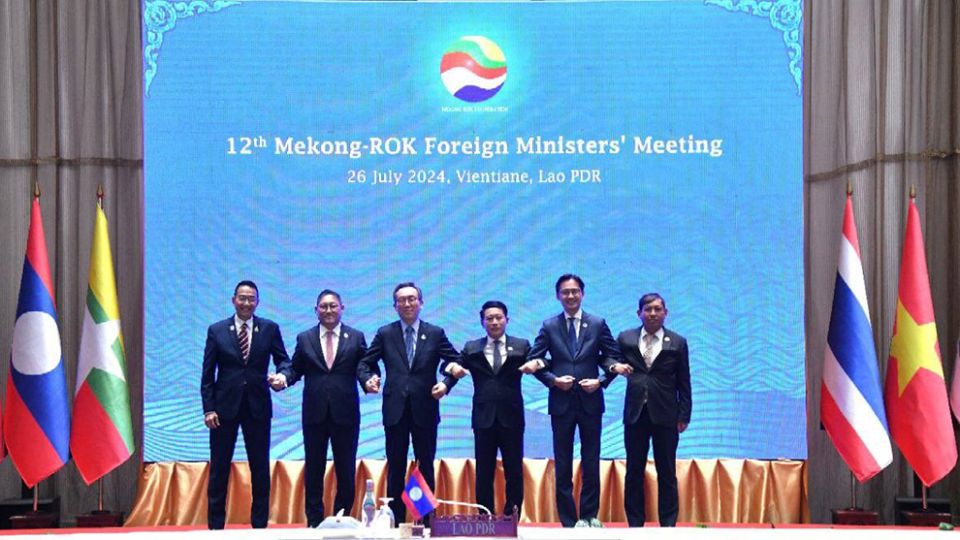July 31, 2024
PHNOM PENH – The countries of the Mekong-Republic of Korea (ROK) Cooperation pledged to strengthen their partnership to promote mutually beneficial development and prosperity in the Mekong sub-region.
The commitment was made at the 12th Mekong-ROK Foreign Ministers’ Meeting on July 26 in Vientiane, Laos. Member countries of the alliance include Korea, Cambodia, Laos, Myanmar, Thailand and Vietnam.
“The foreign ministers underscored their steadfast commitment to further enhancing Mekong-ROK cooperation based on the three pillars of people, prosperity and peace, and the seven priority areas outlined in the Mekong-Han River Declaration. This is to promote sustainable development and bring mutual benefits and prosperity to the Mekong sub-region,” the Ministry of Foreign Affairs and International Cooperation stated in a July 29 press release.
The statement added that since its establishment in 2011, the partnership has made significant progress and achieved fruitful development.
The ministers noted that the plan of action for 2021-2025 was effectively implemented, contributing to strengthening sub-regional connectivity, promoting competitiveness, narrowing the development gap in the Mekong sub-region and building a more resilient community.
At the meeting, foreign affairs minister Sok Chenda Sophea highlighted Korea’s crucial role as a key partner in promoting sustainable development in the sub-region through official development assistance and annual contributions to the Mekong-ROK Cooperation Fund.
Korea recently committed to increasing its financial contribution to the fund to $10 million by 2027.
The minister also thanked Korea for supporting mine action in Cambodia to end the negative impact of explosive remnants of war (ERW) and achieve the country’s 18th Sustainable Development Goal (SDG).
For the future direction of the partnership, he highlighted priority areas including human resources development, climate change adaptation, natural resource management, agriculture and rural development, non-traditional security issues and people-to-people exchange.
He said these priority areas will elevate inclusive and sustainable development in the sub-region.
Ek Bunly, a researcher at the Cambodian Centre for Regional Studies (CCRS), remarked that the Mekong River has always been a vital part of mainland Southeast Asia. It has also become an area where major powers compete for geopolitical influence. He noted that Korea has long been a good partner in the development of the region.
He explained that with Korean president Yoon Suk Yeol’s pledge to turn Korea into a ‘Global Pivotal State’, it is not surprising that Seoul is looking to push that narrative further in the Mekong. Their recent pledge to commit $1 million to the Mekong River Commission (MRC) signals Seoul’s intention to be more than just a transactional partner in Southeast Asia, he added.
Bunly noted that the call from Korea and Mekong countries to strengthen their cooperation further indicates Seoul’s desire to become an additional major power that Mekong countries can rely on, alongside the existing strong presence of the US, China, Japan, Australia and other powers in the region.
“What’s more interesting is the fact that Seoul seems to align its cooperative pledge with the Mekong countries in accordance with the existing regional framework. To me, Seoul is not trying to change or criticise the current apparatus but is instead trying to assimilate itself with the region. In my opinion, this approach could enhance South Korea’s image in the Mekong region even faster than expected.
“At this moment, this is still a pledge, and we will have to see how South Korea and the Mekong countries will operationalise their commitment into action,” Bunly told The Post on July 30.


